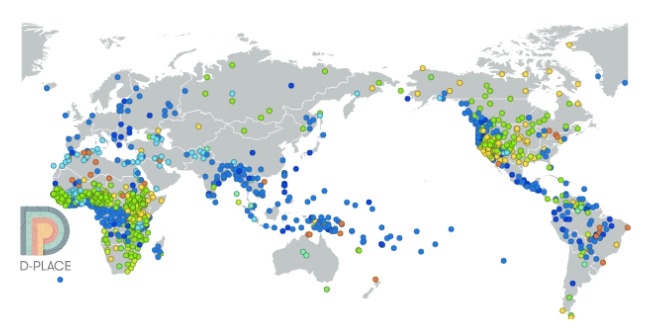
Massive open-access database on human cultures created
D-PLACE — the Database of Places, Language, Culture and Environment — is an expandable, open access database that brings together a dispersed body of information on the language, geography, culture and environment of more than 1,400 human societies. It comprises information mainly on pre-industrial societies that were described by ethnographers in the 19th and early 20th centuries.
The team’s paper on D-PLACE is published in the journal PLOS ONE.
“Human cultural diversity is expressed in numerous ways: from the foods we eat and the houses we build, to our religious practices and political organization, to who we marry and the types of games we teach our children,” said Kathryn Kirby, a postdoctoral fellow in the Departments of Ecology & Evolutionary Biology and Geography at the University of Toronto and lead author of the study. “Cultural practices vary across space and time, but the factors and processes that drive cultural change and shape patterns of diversity remain largely unknown.
“D-PLACE will enable a whole new generation of scholars to answer these long-standing questions about the forces that have shaped human cultural diversity.”
Co-author Fiona Jordan, senior lecturer in anthropology at the University of Bristol and one of the project leads said, “Comparative research is critical for understanding the processes behind cultural diversity. Over a century of anthropological research around the globe has given us a rich resource for understanding the diversity of humanity — but bringing different resources and datasets together has been a huge challenge in the past.
“We’ve drawn on the emerging big data sets from ecology, and combined these with cultural and linguistic data so researchers can visualize diversity at a glance, and download data to analyze in their own projects.”
D-PLACE allows users to search by cultural practice (e.g., monogamy vs. polygamy), environmental variable (e.g. elevation, mean annual temperature), language family (e.g. Indo-European, Austronesian), or region (e.g. Siberia). The search results can be displayed on a map, a language tree or in a table, and can also be downloaded for further analysis.
It aims to enable researchers to investigate the extent to which patterns in cultural diversity are shaped by different forces, including shared history, demographics, migration/diffusion, cultural innovations, and environmental and ecological conditions.
D-PLACE was developed by an international team of scientists interested in cross-cultural research. It includes researchers from Max Planck Institute for the Science of Human history in Jena Germany, University of Auckland, Colorado State University, University of Toronto, University of Bristol, Yale, Human Relations Area Files, Washington University in Saint Louis, University of Michigan, American Museum of Natural History, and City University of New York.
The diverse team included: linguists; anthropologists; biogeographers; data scientists; ethnobiologists; and evolutionary ecologists, who employ a variety of research methods including field-based primary data collection; compilation of cross-cultural data sources; and analyses of existing cross-cultural datasets.
“The team’s diversity is reflected in D-PLACE, which is designed to appeal to a broad user base,” said Kirby. “Envisioned users range from members of the public world-wide interested in comparing their cultural practices with those of other groups, to cross-cultural researchers interested in pushing the boundaries of existing research into the drivers of cultural change.” Source UToronto

Jisc/RLUK study charts sector’s shift towards making research freely available online
Nearly two-thirds of UK researchers support the abolition of journal subscription fees and a move to open access, according to a major study.
A survey of 6,679 academics commissioned by Jisc and Research Libraries UK found that 64 per cent of respondents supported making all academic research freely available, but also found significant differences of opinion by discipline.
Nearly eight out of 10 scholars in medicine and veterinary science backed open access, compared with fewer than half of those working in the arts and humanities.
The survey conducted last autumn is the second of its kind, following a similar study conducted in 2012, and charts how scholarly practice is evolving.
Nearly 40 per cent of respondents to the latest survey said that whether a journal made its articles freely available via the internet was a very important factor in choosing where to publish, compared with around 30 per cent three years ago, although a publication’s readership and reputation remained the key issues.
Thirty-nine per cent of academics said that circulating pre-print versions of research was an important way for them to communicate their findings, compared with 32 per cent in 2012, and one in five believed that academic publishers had been “rendered less important” by scholars’ “increasing ability to share…work directly with peers online”, up six percentage points.
Martin Paul Eve, professor of literature, technology and publishing at Birkbeck, University of London, and founder of the Open Library of the Humanities, said the survey confirmed “what many have been saying anecdotally for years”.
“The ability to disseminate research material online to anyone with internet access, without the reader bearing the cost, is becoming more and more important to researchers from across a broad set of disciplines,” Professor Eve said.
The survey suggests that academics’ relationships with their university libraries are changing as a result of the shift to online publishing.
A quarter of respondents strongly agreed that the role of librarians at their institution was becoming “much less important”, and 15 per cent felt that money spent on library buildings and staff should be redirected to other priorities, with scientists being most likely to give these answers.
However, others reported a growing role for librarians in finding, storing and disseminating research electronically.
Seven out of 10 academics said that they would be happy with their library cancelling its subscription to the print edition of a journal, provided that the electronic version was available, and six out of 10 said they were completely comfortable with journals ceasing production of print editions.
However, the majority of academics continued to prefer printed monographs to e-books and there was a significant increase compared with three years ago in the perceived ease of using print formats for many activities, such as reading in depth and comparing ideas, relative to electronic alternatives.
Paul Feldman, Jisc’s chief executive, said the survey confirmed “that research practice is evolving and academics are embracing this change”.
Asked about their research more broadly, 41 per cent of respondents said that they shaped their research outputs and publication choices to match perceived criteria for success in recruitment and promotion processes, compared with only 25 per cent in 2012. Source Times Higher Education

